“The Beast Within the Shadow,” meaning “Mbisi Wa Mnyama,” in Swahili, is an extraordinary ceremonial mask sculpted in the tradition of power, transformation, and spiritual defiance. Merging influences from African war masks, ancestral animal symbolism, and mythological protection spirits, this piece is a fierce expression of duality—both the beast and guardian, fear and reverence, shadow and clarity.
This mask is unlike any ordinary ritual artifact. It is forged not only as a symbol of protection but also as a threshold—a boundary between the spiritual world and the physical. Rooted in the conceptual traditions of the Bakongo or Chokwe peoples, and interwoven with stylized inspiration from pan-African warrior lore, Mbisi Wa Mnyama channels the archetype of the ancestral beast-spirit, a force called upon in times of war, protection, and inner transformation.
The most striking feature is its double-curved horns, rising powerfully from the crown in twisted arcs. In African cosmology, horns are frequently symbolic of divine communication, wild protection, and sacred aggression. The double spiral on this mask may signify both earthly and celestial guardianship. These are not merely physical features—they are spiritual antennae, meant to receive energy from the heavens and channel it into battle, trance, or transformation.
The face itself is carved with intricate, web-like geometries. Interwoven lattice patterns surround the eyes and mouth, forming a tight mask of containment. This stylized “cage” speaks volumes: it symbolizes discipline of inner chaos, the holding in of unspoken rage, and the sharpening of raw power into intention. Such markings could be interpreted as spirit-seals, placed upon the mask to bind its energy until released in ritual.
The eyes are almond-shaped slits, shrouded in darkness and mystery. These eyes do not blink. They watch and wait. Their placement high on the face suggests elevation—wisdom that sees not just forward, but beyond. In spiritual practice, such a mask may be worn during moon rituals, initiations, or to ward off malevolent spirits believed to disrupt ancestral harmony.
The mouth is fierce, enclosed in angular carvings, but what stands out is its partially hidden jawline—possibly representing silence, restraint, or even secrets held by the ancestors. This is not the open scream of chaos. It is the muzzled growl of wisdom—a reminder that true power does not boast.
Surrounding the mask is a thick mane of animal hair or palm fibers, erupting from the sides and rear like a wild aura. This shaggy halo represents untamed spirit, wildness channeled into ritual. In motion, the mane would move with the wearer, animating the mask with life—becoming part of the performance and augmenting the illusion of an animal-spirit come to life.
The coloration is a deep, weathered combination of ash brown, muted ebony, and raw umber, etched with light reddish-brown undertones that hint at fire, earth, and ancestral bloodlines. The surface has been burnished and distressed, giving it a relic-like quality as though it has seen battle, endured rites, and returned with knowledge.
In its cultural context, Mbisi Wa Mnyama may have been used by warrior societies, initiated shamans, or spiritual hunters. It may have represented a totemic animal spirit invoked for strength, or even a mythical guardian of a sacred forest or threshold. Masks with such fierce expressions are often protective—not to terrify the people, but to terrify the forces that endanger them.
As a piece of contemporary or collector’s art, this mask transforms a space. It brings with it a presence—a silent force that anchors the room with primal energy. Whether placed in a study, private gallery, sacred space, or meditation chamber, Mbisi Wa Mnyama challenges the viewer to confront their own inner beast, to examine where strength meets purpose, and fear meets devotion.
This is not a passive object. It demands reverence. It demands dialogue. It holds the echoes of drums, the hush of moonlit rituals, the rhythm of transformation.
For those drawn to sacred weaponry in visual form, Mbisi Wa Mnyama is a masterpiece of cultural symbolism, a spiritual armor carved in secrecy, worn with purpose, and honored in silence.


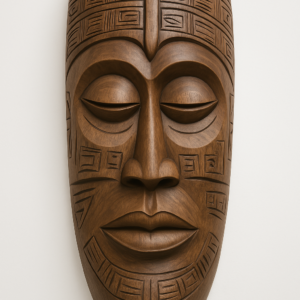
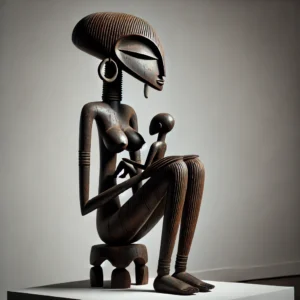
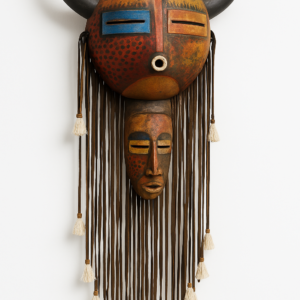
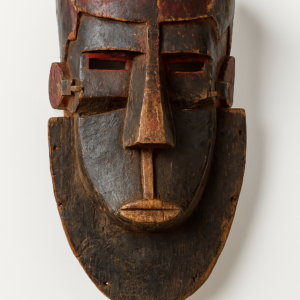
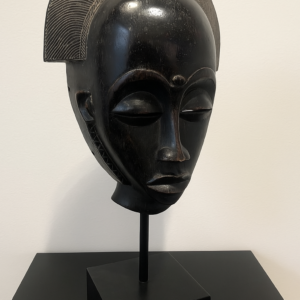
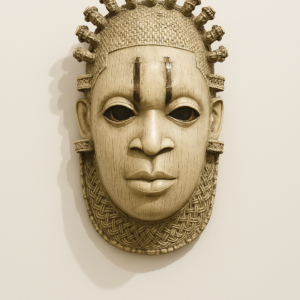
Reviews
There are no reviews yet.